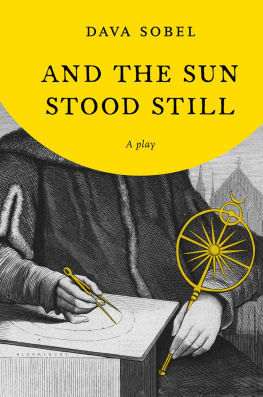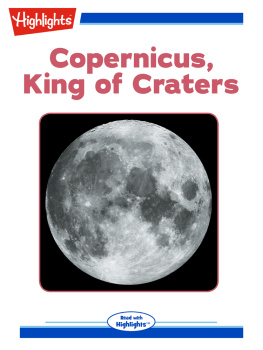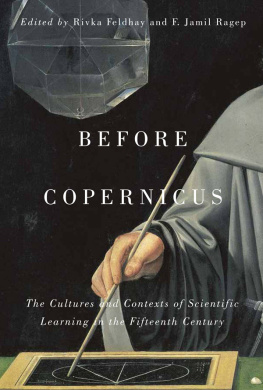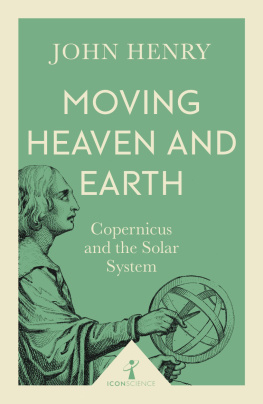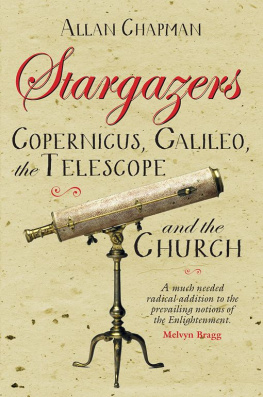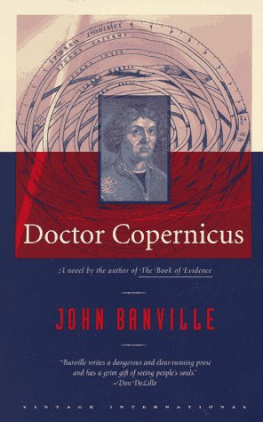THREE TREATISES ON COPERNICAN THEORY

Nicolaus Copernicus
The Commentariolus of Copernicus
The Letter against Werner
The Narratio prima of Rheticus
Translated with Introduction and Notes by
Edward Rosen
Revised Second Edition
DOVER PUBLICATIONS, INC.
MINEOLA, NEW YORK
DOVER THRIFT EDITIONS
GENERAL EDITOR: SUSAN L. RATTINER
EDITOR OF THIS VOLUME: JIM MILLER
Copyright
Copyright 1939, 1959 by Edward Rosen
All rights reserved.
Bibliographical Note
This Dover edition, first published in 2018, is a republication of the 1959 Dover revised second edition of Three Copernican Treatises, originally published in 1939 by the Columbia University Press, New York. The annotated Copernicus Bibliography, 19391958, from the 1959 edition is available online at: www.doverpublications.com/0486827755.
Library of Congress Cataloging-in-Publication Data
Names: Copernicus, Nicolaus, 14731543, author. | Rosen, Edward, 1906 editor, translator.
Title: Three treatises on Copernican theory : the Commentariolus of Copernicus : the Letter against Werner : the Narratio prima of Rheticus / Nicholas Copernicus; translated with an introduction and notes by Edward Rosen.
Other titles: Commentariolus. English
Description: Second edition, Dover edition [2018 edition]. | Mineola, New York : Dover Publications, Inc., 2018. | Originally published as thesis of Edward Rosen (Ph. D.)Columbia University, 1939. | Republication of: New York : Dover Publications, 1959, revised second edition. | Includes bibliographical references and index.
Identifiers: LCCN 2018023411| ISBN 9780486827759 | ISBN 0486827755
Subjects: LCSH: AstronomyEarly works to 1800. | Werner, Johannes, 1468-1528. De motu octavae sphaerae. | Copernicus, Nicolaus, 14731543. Epistola Coppernici contra Wernerum. English. | Rhaticus, Georg Joachim, 15141576. De libris revolutionum Nicolai Copernici narratio prima. English.
Classification: LCC QB41 .C84 2018 | DDC 520dc23
LC record available at https://lccn.loc.gov/2018023411
Manufactured in the United States by LSC Communications
82775501 2018
www.doverpublications.com
for Sally
PREFACE
I T IS a matter of amazement and regret to many persons interested in the history of civilization that the writings of Copernicus, universally regarded as the founder of modern astronomy, have not yet been made available in the English language. When Professor Frederick Barry suggested that I might attempt to satisfy this need, he pointed out that the Commentariolus and the Narratio prima are better suited to convey Copernicuss ideas to the general reader than is his classic work De revolutionibus orbium caelestium. For these treatises are briefer, and they are relatively free from the extensive calculations necessarily included in the volume that established the heliocentric system. There is, moreover, a historical reason for reproducing the Commentariolus and the Narratio prima; for it was by these papers from the hands of the rebel cosmic architect and his first disciple that the learned world was first apprised of the revolution in the conceptual structure of the universe.
The Letter against Werner possesses intrinsic interest of its own. It throws light on the development of Copernicuss thought. The letter and the Commentariolus constitute his minor astronomical works. For these reasons it was included in this book.
I desire to record my gratitude to Professor Austin P. Evans for his editorial guidance. To the many friends and colleagues who have cheerfully given me of their special knowledge I express heartfelt thanks. For the errors that nevertheless appearand it is rash to hope that a book of this sort can be entirely free from errorfull and sole responsibility rests upon the author.
E. R.
College of the City of New York
September 4, 1939
CONTENTS
ABBREVIATIONS
| GW | Gesamtkatalog der Wiegendrucke (Leipzig, 1925). |
| H | J. L. Heibergs Teubner edition of the Greek text of Ptolemys Syntaxis mathematica (Leipzig, 18981903) |
| HI: Vol. I |
| HII: Vol. II |
| MCV | Mittheilungen des Coppernicus-Vereins fr Wissenschaft und Kunst zu Thorn |
| P | Leopold Prowe, Nicolaus Coppernicus (Berlin, 188384) |
| PI: Vol. I, Pt. I |
| PI2: Vol. I, Pt. II |
| PII: Vol. II |
| PW | Paulys Real-encyclopdie der classischen Altertumswissenschaft, neue Bearbeitung, ed. Wissowa, Kroll (Stuttgart, 1894) |
| S | The Stockholm MS of the Commentariolus |
| Th | Nicolai Copernici Thorunensis De revolutionibus orbium caelestium libri VI (Thorn, 1873) |
| V | The Vienna MS of the Commentariolus |
| ZE | Zeitschrift fr die Geschichte und Alterthumskunde Ermlands |
In references to texts the page number is followed by a period and the line number: e.g., Th 447.8.
In references to books which are numbered by leaf, not by page, r stands for recto, and v for verso: e.g., Conrad Gesner, Bibliotheca universalis, Appendix, p.5v.
In references to early printed books which are numbered by signature, the citation gives the page number within the signature: e.g., Augustinus Ricius, De motu octavae sphaerae, fol. e6r.
INTRODUCTION
NICOLAUS COPERNICUS
N ICOLAUS COPERNICUS was born in 1473 at Thorn on the banks of the Vistula. His father was a prosperous merchant and municipal official in the old Hansa town. But he died when Nicolaus was only ten years old; and it was the boys good fortune to have for maternal uncle Lucas Watzelrode, who became Bishop of Ermland in 1489. The uncle took a fatherly interest in the nephew, guiding his way and smoothing his path. While Copernicus was still a young man, Bishop Lucas designated him a canon of the Cathedral of Frauenburg. He enjoyed the income from this ecclesiastical post until his death (May 24, 1543) at the scriptural age of seventy; and before he was thirty years old, he received in addition an appointment to a sinecure at Breslau.
Copernicus had his elementary schooling in his native city and entered the University of Cracow in 1491. After several years of attendance at the renowned Polish center of learning, he journeyed to Italy in 1496. At Bologna and Padua he studied the liberal arts, medicine, and law, obtaining the doctors degree in canon law at Ferrara in 1503.
Shortly after his return from Italy his first published work appeared from the press, a translation of an inferior Greek epistolographer into Latin. But it was not only in this concern with classical antiquity that Copernicus showed himself a man of the Renaissance. He also strove to achieve the many-sided accomplishments of that humanistic ideal, the universal man. He was competent in canon law; he practiced medicine; he wrote a tract on coinage; he served his cathedral chapter as an administrator and diplomatic representative; he painted his own portrait; he made many of his own astronomical instruments; and he established the heliocentric system on a firm basis.
Germans and Poles have bitterly disputed the question of Copernicuss ethnic origin, each national group claiming the distinguished astronomer for its own. Where does the truth lie in this controversy? Politically, Copernicus was a subject of the king of Poland; he remained loyal to the Roman Catholic church; and he wrote chiefly in Latin, but a few of his private letters were composed in German.
Next page

